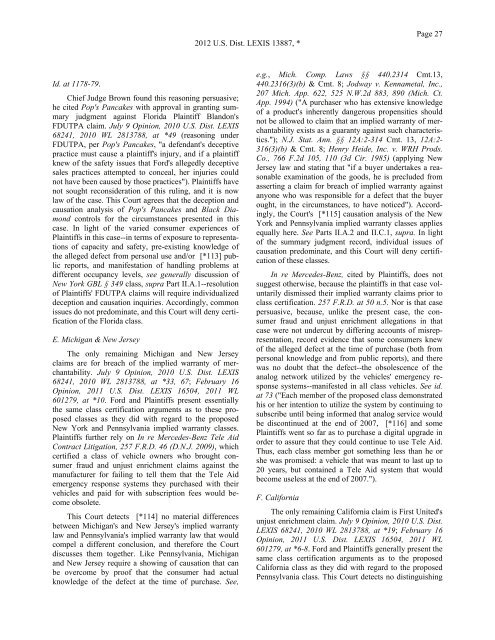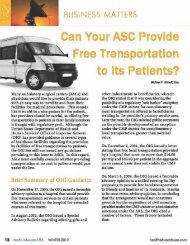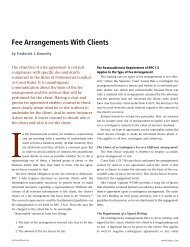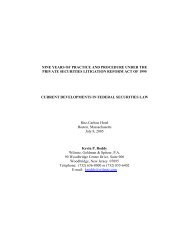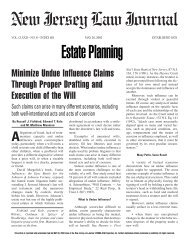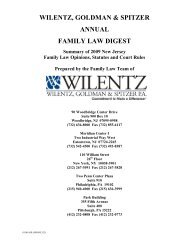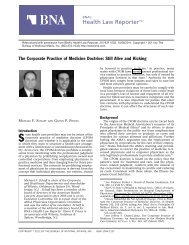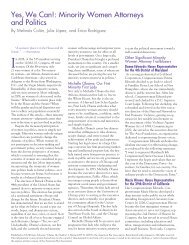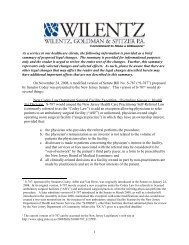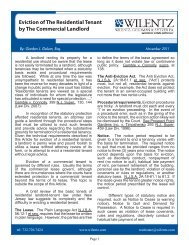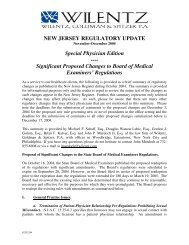In re Ford Motor Co. E-350 Can Products Liability Litigation (No. II)
In re Ford Motor Co. E-350 Can Products Liability Litigation (No. II)
In re Ford Motor Co. E-350 Can Products Liability Litigation (No. II)
Create successful ePaper yourself
Turn your PDF publications into a flip-book with our unique Google optimized e-Paper software.
2012 U.S. Dist. LEXIS 13887, *Page 27Id. at 1178-79.Chief Judge Brown found this <strong>re</strong>asoning persuasive;he cited Pop's Pancakes with approval in granting summaryjudgment against Florida Plaintiff Blandon'sFDUTPA claim. July 9 Opinion, 2010 U.S. Dist. LEXIS68241, 2010 WL 2813788, at *49 (<strong>re</strong>asoning underFDUTPA, per Pop's Pancakes, "a defendant's deceptivepractice must cause a plaintiff's injury, and if a plaintiffknew of the safety issues that <strong>Ford</strong>'s allegedly deceptivesales practices attempted to conceal, her injuries couldnot have been caused by those practices"). Plaintiffs havenot sought <strong>re</strong>consideration of this ruling, and it is nowlaw of the case. This <strong>Co</strong>urt ag<strong>re</strong>es that the deception andcausation analysis of Pop's Pancakes and Black Diamondcontrols for the circumstances p<strong>re</strong>sented in thiscase. <strong>In</strong> light of the varied consumer experiences ofPlaintiffs in this case--in terms of exposu<strong>re</strong> to <strong>re</strong>p<strong>re</strong>sentationsof capacity and safety, p<strong>re</strong>-existing knowledge ofthe alleged defect from personal use and/or [*113] public<strong>re</strong>ports, and manifestation of handling problems atdiffe<strong>re</strong>nt occupancy levels, see generally discussion ofNew York GBL § 349 class, supra Part <strong>II</strong>.A.1--<strong>re</strong>solutionof Plaintiffs' FDUTPA claims will <strong>re</strong>qui<strong>re</strong> individualizeddeception and causation inquiries. Accordingly, commonissues do not p<strong>re</strong>dominate, and this <strong>Co</strong>urt will deny certificationof the Florida class.E. Michigan & New JerseyThe only <strong>re</strong>maining Michigan and New Jerseyclaims a<strong>re</strong> for b<strong>re</strong>ach of the implied warranty of merchantability.July 9 Opinion, 2010 U.S. Dist. LEXIS68241, 2010 WL 2813788, at *33, 67; February 16Opinion, 2011 U.S. Dist. LEXIS 16504, 2011 WL601279, at *10. <strong>Ford</strong> and Plaintiffs p<strong>re</strong>sent essentiallythe same class certification arguments as to these proposedclasses as they did with <strong>re</strong>gard to the proposedNew York and Pennsylvania implied warranty classes.Plaintiffs further <strong>re</strong>ly on <strong>In</strong> <strong>re</strong> Mercedes-Benz Tele Aid<strong>Co</strong>ntract <strong>Litigation</strong>, 257 F.R.D. 46 (D.N.J. 2009), whichcertified a class of vehicle owners who brought consumerfraud and unjust enrichment claims against themanufactu<strong>re</strong>r for failing to tell them that the Tele Aidemergency <strong>re</strong>sponse systems they purchased with theirvehicles and paid for with subscription fees would becomeobsolete.This <strong>Co</strong>urt detects [*114] no material diffe<strong>re</strong>ncesbetween Michigan's and New Jersey's implied warrantylaw and Pennsylvania's implied warranty law that wouldcompel a diffe<strong>re</strong>nt conclusion, and the<strong>re</strong>fo<strong>re</strong> the <strong>Co</strong>urtdiscusses them together. Like Pennsylvania, Michiganand New Jersey <strong>re</strong>qui<strong>re</strong> a showing of causation that canbe overcome by proof that the consumer had actualknowledge of the defect at the time of purchase. See,e.g., Mich. <strong>Co</strong>mp. Laws §§ 440.2314 Cmt.13,440.2316(3)(b) & Cmt. 8; Jodway v. Kennametal, <strong>In</strong>c.,207 Mich. App. 622, 525 N.W.2d 883, 890 (Mich. Ct.App. 1994) ("A purchaser who has extensive knowledgeof a product's inhe<strong>re</strong>ntly dangerous propensities shouldnot be allowed to claim that an implied warranty of merchantabilityexists as a guaranty against such characteristics.");N.J. Stat. Ann. §§ 12A:2-314 Cmt. 13, 12A:2-316(3)(b) & Cmt. 8; Henry Heide, <strong>In</strong>c. v. WRH Prods.<strong>Co</strong>., 766 F.2d 105, 110 (3d Cir. 1985) (applying NewJersey law and stating that "if a buyer undertakes a <strong>re</strong>asonableexamination of the goods, he is p<strong>re</strong>cluded fromasserting a claim for b<strong>re</strong>ach of implied warranty againstanyone who was <strong>re</strong>sponsible for a defect that the buyerought, in the circumstances, to have noticed"). Accordingly,the <strong>Co</strong>urt's [*115] causation analysis of the NewYork and Pennsylvania implied warranty classes appliesequally he<strong>re</strong>. See Parts <strong>II</strong>.A.2 and <strong>II</strong>.C.1, supra. <strong>In</strong> lightof the summary judgment <strong>re</strong>cord, individual issues ofcausation p<strong>re</strong>dominate, and this <strong>Co</strong>urt will deny certificationof these classes.<strong>In</strong> <strong>re</strong> Mercedes-Benz, cited by Plaintiffs, does notsuggest otherwise, because the plaintiffs in that case voluntarilydismissed their implied warranty claims prior toclass certification. 257 F.R.D. at 50 n.5. <strong>No</strong>r is that casepersuasive, because, unlike the p<strong>re</strong>sent case, the consumerfraud and unjust enrichment allegations in thatcase we<strong>re</strong> not undercut by differing accounts of mis<strong>re</strong>p<strong>re</strong>sentation,<strong>re</strong>cord evidence that some consumers knewof the alleged defect at the time of purchase (both frompersonal knowledge and from public <strong>re</strong>ports), and the<strong>re</strong>was no doubt that the defect--the obsolescence of theanalog network utilized by the vehicles' emergency <strong>re</strong>sponsesystems--manifested in all class vehicles. See id.at 73 ("Each member of the proposed class demonstratedhis or her intention to utilize the system by continuing tosubscribe until being informed that analog service wouldbe discontinued at the end of 2007, [*116] and somePlaintiffs went so far as to purchase a digital upgrade inorder to assu<strong>re</strong> that they could continue to use Tele Aid.Thus, each class member got something less than he orshe was promised: a vehicle that was meant to last up to20 years, but contained a Tele Aid system that wouldbecome useless at the end of 2007.").F. CaliforniaThe only <strong>re</strong>maining California claim is First United'sunjust enrichment claim. July 9 Opinion, 2010 U.S. Dist.LEXIS 68241, 2010 WL 2813788, at *19; February 16Opinion, 2011 U.S. Dist. LEXIS 16504, 2011 WL601279, at *6-8. <strong>Ford</strong> and Plaintiffs generally p<strong>re</strong>sent thesame class certification arguments as to the proposedCalifornia class as they did with <strong>re</strong>gard to the proposedPennsylvania class. This <strong>Co</strong>urt detects no distinguishing


